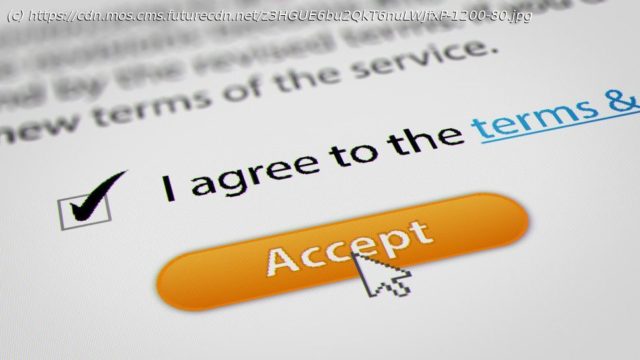Reading VPN small print can be fun! Okay, maybe not, but you can get vital details on the service, and it’s quicker and easier than you think.
It’s almost automatic: you’re signing up with a VPN, the ‘Check to confirm you agree with the Terms and Conditions’ message pops up and, within a nano-second, you’ve clicked the box. Because getting on with your day is far more appealing than scrolling through 5,000 words of confusing legal jargon. You’re not alone. We regularly do it, too. But it could be a mistake. A VPN’s terms and conditions contain all kinds of handy information on who can use the service, refund rules, payment and billing terms, important details that you might not find anywhere else. You don’t have to read every word of the terms, either. Look out for the key items we’ll explain in a moment, and you can skim over everything else. Just 60 seconds scrolling down the page and browsing a few words could help you avoid the worst VPNs, and identify the very best. Then it’s your chance to move on to the VPN privacy policy… The first reason you really, really need to scan your VPN’s terms page, is it’s probably the only page on the website which fully explains what you’re getting for your money. We’re talking about the precise details. Is this a personal-use service only, or can you use it for business? How many devices can you connect simultaneously? Do they have to be all yours, or can you share logins with family members? Are there any odd device restrictions? ( Astrill VPN says you can only install the service on a single router, for instance.) This might not matter very much if you’re just after an iPhone VPN, say, and you’ll never use it anywhere else. But if your needs are a little complicated, check what you’re getting before you buy. Some VPN providers give you no idea who’s behind them, or where they’re based. Are they in the US, China, Russia…? The main site may offer no clues at all. The TS&Cs are often more helpful. Look first for any information on a company behind the provider. For example, NordVPN’s terms mention: «nordvpn s.a., a company incorporated in Panama.» As a provider’s terms are designed to hold up in law, many providers also tell you which country’s law they’re following. ExpressVPN’s ‘Choice of Law’ section is typical: «This Agreement shall be governed by and construed in accordance with the laws of the British Virgin Islands.» Some services boast about their generous refund policy and VPN free trial, while others don’t mention it all. Whatever your provider says on the main website, it pays to check the Ts&Cs to get the real details.






